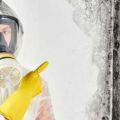Mold: get rid of it with the help of professionals

The presence of mold in residential premises is dangerous; therefore, it is desirable to have it removed as quickly as possible. The costs inherent in this operation will vary greatly, depending on the extent of the mold.
This article will explain the causes of mold and the problematic areas where it is most often found, and how to find a professional capable of removing it permanently.
What exactly is mold?
Mold is a microorganism invisible to the naked eye. What we are seeing are the spores and mycelial filaments that grow slowly on the affected surfaces. Without intervention, real mold patches can develop.
In order to appear, mold needs moisture, oxygen, heat, and a nutrient substrate. Unfortunately, on this last point, it is not difficult.
Food, clothing, or building materials like plaster, paints, wood, or soil, up to some man-made materials, mold can grow anywhere. Even simple household dust can suffice.
Even though mold fungi can take on all kinds of different colors and appearances, their colors give no indication of how dangerous they are, and getting rid of them will always be the top priority.
Where does mold most often grow?
Molds develop particularly often in the following cases:
Condensation: The humidity in the air is deposited on walls, ceilings, and windows as well as on window frames, under the effect of heating which lets mold to grow.
Heat transfer: Especially in the cold season, the heat in your house or apartment is thwarted by the coldness of the masonry. The colder it is, the greater the likelihood of moisture depositing.
Cracks in masonry: Time passing or very bad weather can damage the walls of a house. The cracks then allow outside moisture to penetrate and mold fungi infiltrate inside.
Poor ventilation- Poor ventilation and insufficient heating also provide them the environment to develop and grow. A family of four produces by its daily activities (cooking, washing, breathing) 10 to 12 liters of water that floats in the air.
In airtight buildings, which are particularly energy-efficient, it is possible to prevent mold invasions by heating and ventilating correctly. It is recommended that you let fresh air into the home several times a day in order to evacuate the humid air. It is also important to establish a pleasant warmth in the room, heating it with dry air.
If you locate the affected area yourself, you will save the professional the task of looking for mold. However, it is a good idea, when you call in a specialist, to ask them to check that there are no other invaded areas. Do not hesitate to help yourself with the Mold Inspection and testing Services in San Francisco.
Who can permanently eliminate mold?
Before having mold removed, it is always a good idea to determine its origin. Also, remember that disposal must be done with care and that it is inevitable that mold spores will disperse into the air. Inhaling mold from the air is dangerous for your health. If you have any doubts about how to get rid of mold, it is better to call Licensed General contractors and Certified mold inspectors.
Since the presence of mold in a home is to be taken seriously, it is advisable to make sure that it will be properly eliminated. Indeed, if the treatment is poorly done, mold can quickly return. So ask for several offers, compare the services offered and ask for references from Mold Inspection and Mold remediation company.







